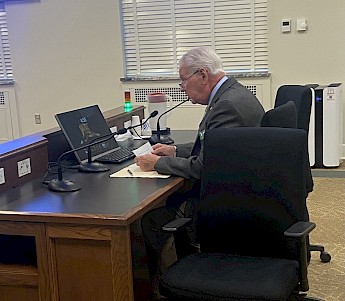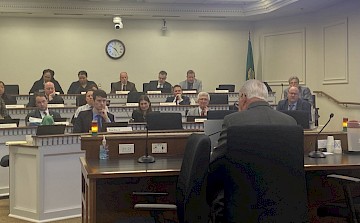February 14, 2025
AAWA Testifies in Favor of HB 1921
AAWA VP Gary Wirt testifying in support of HB 1921 Road Usage Charge (WA House Transportation Committee, 2/13/25)
Representative Fey, members of the Committee; thank you for this opportunity to express support for HB-1921.
For the record, my name is Gary Wirt. I am a resident of Yakima and am Vice President of All Aboard Washington, a 501 c 3 non-profit organization that has been promoting rail as an integral part of Washington state’s transportation solutions for more than 40 years.
I personally own an electric vehicle, and an internal combustion engine vehicle. I purchased my new electric vehicle 10 months ago and have driven it 6,000 miles, mostly on Washington state roads & highways without purchasing any gasoline. I purchased my electric vehicle primarily to help reduce greenhouse gas emissions, not to avoid paying my fair share of the cost of using our public roads.
I, and All Aboard Washington, support HB-1921 not only because we believe that all users of our state highway system should share in the associated costs, but we also believe that our state must expand and improve modes of transportation such as public transit and passenger rail which provide benefits to rural areas and reduce vehicle miles traveled (VMT). Reducing VMT reduces highway congestion, thereby reducing the need for new highway construction, and reducing highway maintenance & preservation costs.
We support HB-1921 also because the bill provides a revenue source for investment in transportation modes other than just highways. Other modes of transportation, such as rail, can move people and goods more efficiently than cars or trucks. On average, freight railroads move a ton of cargo 479 miles on one gallon of fuel, which is about 11 times more energy efficient than trucks on a ton-mile basis.
Passenger rail is 3 times more efficient than a car on a passenger-mile basis at current occupancy levels. This efficiency is because steel wheels on steel rails have less resistance than rubber tires on asphalt or concrete.1 Transportation accounts for 29% of total U. S. greenhouse gas emissions.2 The efficiency of rail transportation reduces energy consumption, which leads to lower greenhouse gas emissions. The quickest way to decrease greenhouse gases from transportation is to travel by train, and move goods by rail, instead of by roads or by air. The only transportation methods more environmentally friendly than trains are walking and cycling.
In conclusion, rail must become the backbone of our surface transportation network because of its energy efficiency, low carbon emissions, electrification potential, and reduction in vehicle miles traveled. HB-1921 provides the means for us to develop a multi-modal transportation system that reduces reliance on our state highway system. For these reasons, I personally, and All Aboard Washington, wholeheartedly support HB-1921.
Thank you.
1 Andreas Hoffrichter, April 2019; Rail Travel is Cleaner than Driving or Flying, but will Americans buy in?; Michigan State University, Center for Railway Research and Education.
2 Oakridge National Laboratory, Transportation Energy Data Book, Edition 39; Table 12.04


